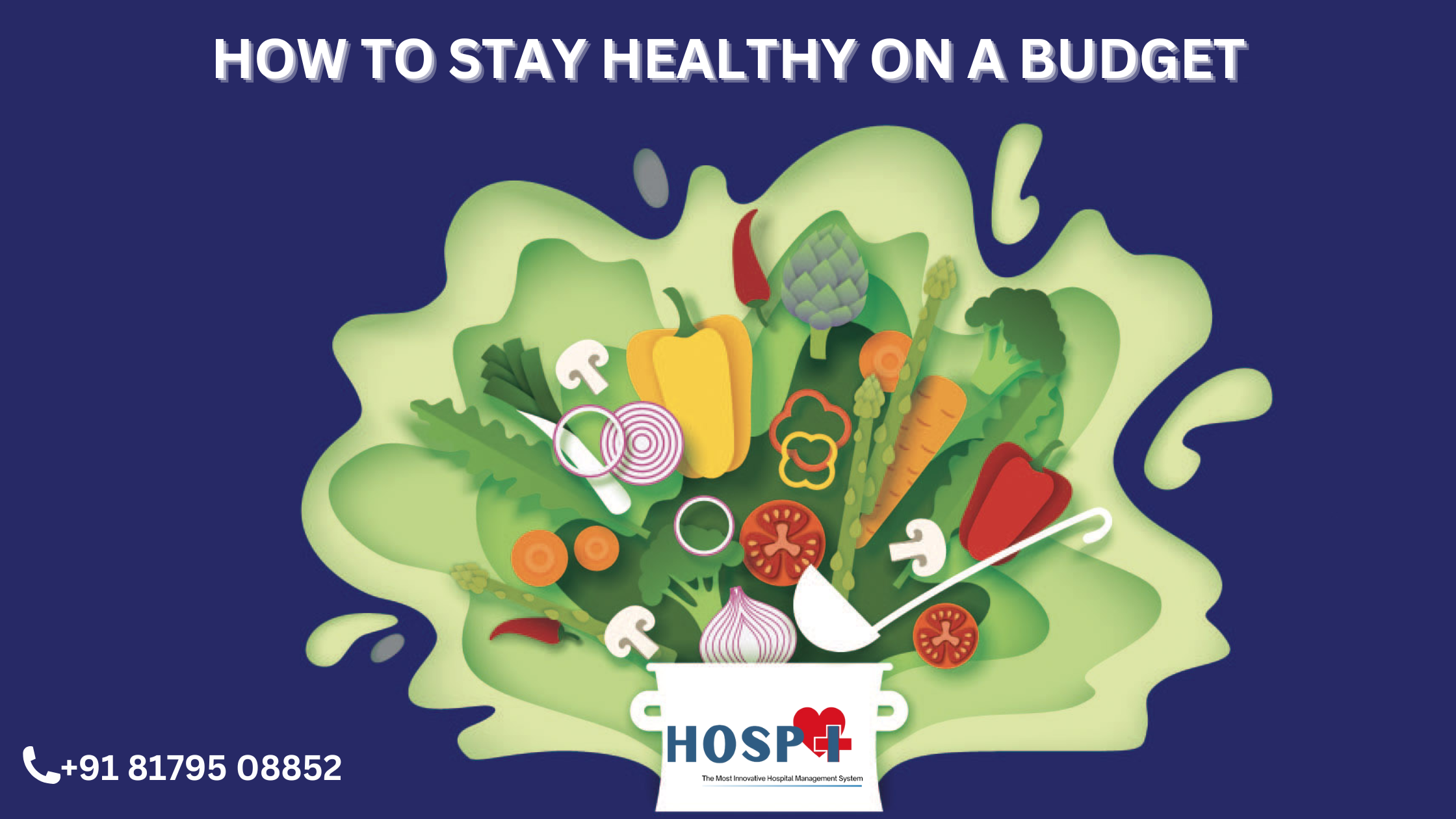Looking to modernize your Hospital, Lab or Clinic?
Hospi is trusted across 25 Indian states for billing, EMR, lab reports, automations & more.
Maintaining good health is essential for a fulfilling life, but it can be challenging, especially when you’re on a tight budget. Many people believe that staying healthy requires expensive gym memberships, organic foods, and costly healthcare. However, with careful planning and creativity, you can prioritize your well-being without draining your wallet. This article will explore various ways to stay healthy on a budget, empowering you to take charge of your health and finances simultaneously.
Importance of Health on a Budget
Prioritizing Health Within Financial Constraints
When money is tight, health often takes a back seat. However, neglecting your well-being can lead to more significant financial burdens in the long run. It’s crucial to recognize the value of investing in your health, even when dealing with budget limitations.
Understanding the Link Between Health and Finances
Maintaining good health can positively impact your financial situation. By preventing costly medical expenses and improving productivity, investing in your health becomes a financially savvy decision.
Affordable Nutrition
Nourishing Your Body Without Breaking the Bank
Eating nutritious foods doesn’t have to be expensive. With a little planning and savvy shopping, you can enjoy a balanced and wholesome diet on a budget.
Budget-Friendly Grocery Shopping Tips
Learn how to make the most of your grocery budget by choosing affordable, nutrient-rich foods, and utilizing money-saving strategies such as buying in bulk and opting for seasonal produce.
Budget-Friendly Exercise
Staying Active on a Tight Budget
Physical activity is crucial for overall health, but gym memberships and fitness classes can be costly. Discover alternative ways to stay active without spending a fortune.
Free and Low-Cost Exercise Options
Explore various free and budget-friendly exercise options, including outdoor activities, home workouts, and community fitness programs.
Preventive Care on a Budget
The Value of Preventive Health Measures
Preventing health issues is more cost-effective than treating them. Learn about the importance of preventive care and its long-term financial benefits.
Accessing Affordable Preventive Healthcare Services
Discover low-cost or free preventive healthcare services, including vaccinations, screenings, and check-ups, offered through community health centers and government programs.
Stress Management and Mental Health
Nurturing Your Mental Well-being
Maintaining good mental health is vital for overall well-being. Explore strategies to manage stress and support your mental health without straining your budget.
Cost-Effective Stress Reduction Techniques
Learn about relaxation techniques, mindfulness practices, and budget-friendly self-care activities to enhance your mental and emotional well-being.
Quality Sleep on a Budget
The Importance of Restful Sleep for Health
Sleep is essential for overall health, but investing in a quality sleep environment doesn’t have to be expensive.
Creating a Budget-Friendly Sleep Environment
Discover tips for improving your sleep quality, such as establishing a bedtime routine and making simple adjustments to your sleeping space.
Affordable Health Insurance Options
Exploring Health Insurance Choices
Having health insurance provides a safety net in case of unexpected medical expenses. Explore different health insurance options available to individuals on a budget.
Government and Community-Based Programs
Learn about government-sponsored health insurance programs and community-based initiatives that offer affordable coverage to eligible individuals.
Community Resources for Health
Tapping Into Local Health Support
Many communities offer valuable resources for maintaining health on a budget. Discover local organizations and initiatives that can support your well-being.
Low-Cost Health Services and Programs
Explore community clinics, health fairs, and support groups that provide low-cost or free health services and educational programs.
Conclusion
Staying healthy on a budget is possible with a little creativity and resourcefulness. By prioritizing your well-being and exploring cost-effective options for nutrition, exercise, preventive care, mental health, and sleep, you can make significant strides in maintaining a healthy lifestyle without compromising your finances.
To read some more articles like this, Visit this site: https://hospi.info/blog
Search more here: https://www.google.com/
FAQs
- Is it possible to eat a healthy diet on a tight budget? Yes, you can! By choosing affordable nutrient-rich foods, buying in bulk, and planning your meals, you can nourish your body without breaking the bank.
- Are there free exercise options available? Absolutely! There are plenty of free and low-cost exercise options, including outdoor activities, bodyweight workouts, and community fitness programs.
- Why is preventive care important for budget-conscious individuals? Preventive care helps identify and address health issues early, preventing costly medical expenses down the road and promoting overall well-being.
- How can I manage stress on a budget? There are several cost-effective stress reduction techniques, such as practicing mindfulness, engaging in hobbies, and spending time in nature.
- What are some affordable health insurance options? If you’re on a budget, explore government-sponsored health insurance programs and community-based initiatives that offer affordable coverage to eligible individuals.
Want a quick walkthrough of Hospi?
We offer gentle, no-pressure demos for hospitals, labs & clinics.
Or call us directly: +91 8179508852


